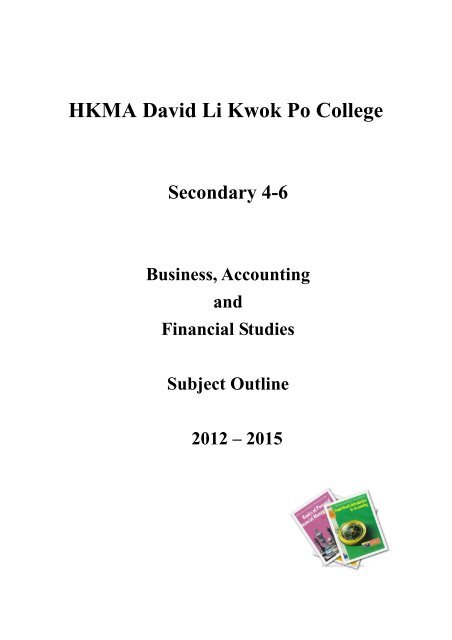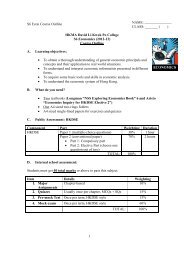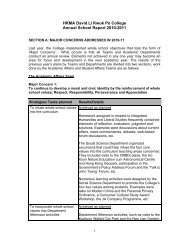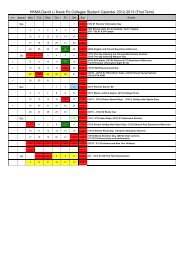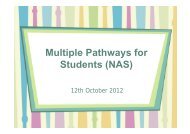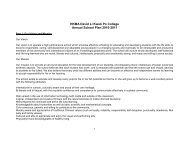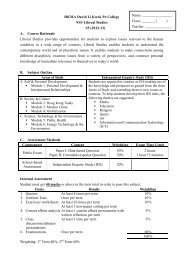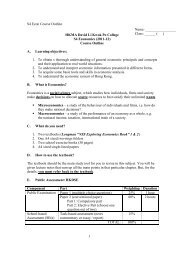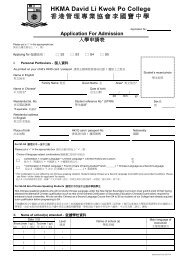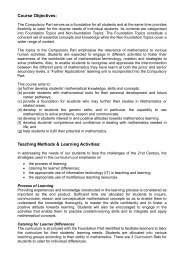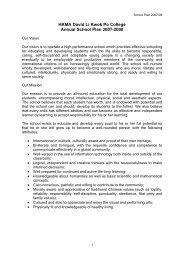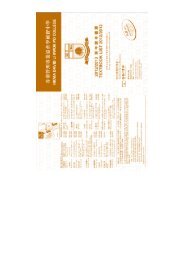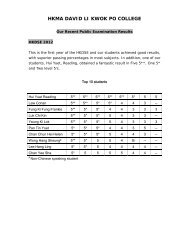S4-6 - HKMA David Li Kwok Po College
S4-6 - HKMA David Li Kwok Po College
S4-6 - HKMA David Li Kwok Po College
You also want an ePaper? Increase the reach of your titles
YUMPU automatically turns print PDFs into web optimized ePapers that Google loves.
<strong>HKMA</strong> <strong>David</strong> <strong>Li</strong> <strong>Kwok</strong> <strong>Po</strong> <strong>College</strong><br />
Secondary 4-6<br />
Business, Accounting<br />
and<br />
Financial Studies<br />
Subject Outline<br />
2012 – 2015
Subject Teachers: Ms. Lydia Lui and Ms. Karen Chan<br />
Part A – Learning Objectives<br />
Through the study of the BAFS curriculum, students will be able to develop<br />
knowledge and understanding of:<br />
the intertwined relationships of different business areas;<br />
the dynamic environment in which businesses operate, where changes influence<br />
planning and decision-making;<br />
the importance of accounting in managing a business;<br />
the functions of management in formulating effective strategies for businesses; and<br />
the importance of managing personal finance.<br />
Students are expected to develop generic skills, in particular, the ability to:<br />
use information technology to locate, select and organize relevant business<br />
information for decision-making;<br />
investigate, analyze and evaluate business issues from a variety of perspectives;<br />
communicate business information and issues effectively; and<br />
work in a team situation and assume a leadership role.<br />
Students are expected to develop positive values and attitudes so that they may:<br />
be informed, active and responsible participants in the business world;<br />
be critically aware of the importance of socially responsible and ethical business<br />
behaviour; and<br />
behave responsibly in controlling their personal finances.<br />
Part B – Conduct of the class<br />
We live in a dynamic world in which active involvement is required. To get the most<br />
out of this class --- active participation in class is expected. The emphasis will be on<br />
active learning. It is expected that you will be actively involved in each class through<br />
class discussions, small group work, asking questions, etc.<br />
2
Part C – Curriculum<br />
Secondary<br />
4<br />
Secondary<br />
5 & 6<br />
Compulsory<br />
Part<br />
(Paper 1)<br />
Elective Part<br />
Business<br />
Environment<br />
Introduction<br />
to<br />
Management<br />
Introduction<br />
to Accounting<br />
Basics of<br />
Personal<br />
Financial<br />
Management<br />
Accounting<br />
Module<br />
(Paper 2A)<br />
Business<br />
Management<br />
Module<br />
(Paper 2B)<br />
•Hong Kong Business Environment<br />
•Forms of Business Ownership<br />
•Business Ethics and Social Responsibilities<br />
•Management Functions<br />
•Effective Management<br />
•Key Business Functions<br />
•Entrepreneurship and Small and Medium<br />
Enterprises (SMEs) Management<br />
•Business Communication<br />
•Purposes and the Changing Role of Accounting<br />
•Uses of Financial Statements<br />
•Accounting Principles and Conventions<br />
•The Accounting Cycle<br />
•Basic Ratio Analysis<br />
•Fundamentals of Financial Management<br />
•Personal Financial Management<br />
Financial<br />
Accounting<br />
Cost<br />
Accounting<br />
Financial<br />
Management<br />
Human<br />
Resources<br />
Management<br />
Marketing<br />
Management<br />
•Adjustments for the preparation of<br />
financial statements<br />
•Financial reporting for different forms<br />
of business ownership<br />
•Control Systems<br />
•Generally Accepted Accounting<br />
Principles<br />
•Financial Analysis<br />
•Incomplete Records<br />
•IT Applications in Accounting<br />
•Ethical Issues in Accounting<br />
•Cost classification, concepts and<br />
terminology<br />
•Job Costing<br />
•Marginal and Absorption Costing<br />
•Cost Accounting for decision-making<br />
OR<br />
•Financial Analysis<br />
•Budgeting<br />
•Sources of Financing<br />
•Capital Investment Appraisal<br />
•Working Capital Management<br />
•Risk Management<br />
•Functions of Human Resources<br />
Management<br />
•Development of a Quality Workforce<br />
•Role of Marketing<br />
•Marketing Research<br />
•Customer Behaviour<br />
•Marketing Strategies for Goods and<br />
Services<br />
•Consumerism<br />
3
Part D – Textbook<br />
Compulsory Module<br />
Pak Cho Kan and Lam Pun Lee, Business Environment and Introduction to<br />
Management, Longman, 2009.<br />
Eric Lo Chi Chung and Frank Wood, Frank Wood’s Introduction to Accounting,<br />
Longman, 2009.<br />
Louis Cheng, Basics of Personal Financial Management, Longman, 2009.<br />
Part E – Assessment breakdown<br />
To pass this subject you must obtain a minimum of 40% overall and you must<br />
complete each component of assessment to a satisfactory standard.<br />
The overall mark will be calculated as follows:<br />
<strong>S4</strong> – S5 S6<br />
Continuous Assessment Mark* 40% 30%<br />
Examination (One per term – January & June) 60% 70%<br />
100% 100%<br />
* The continuous assessment mark will be calculated as follows:<br />
<strong>S4</strong><br />
Components Term 1 Term 2<br />
Business Homework 10% 10%<br />
Management Quiz 15% 15%<br />
Module (50%) Sub-total 25% 25%<br />
Accounting<br />
Module (50%)<br />
Homework 10% 10%<br />
Quiz 15% 15%<br />
Sub-total 25% 25%<br />
Uniform Test 10% 10%<br />
Commentary writing /<br />
Participation in subject related<br />
activities<br />
5% 5%<br />
40% 40%<br />
4
S5<br />
Components Term 1 Term 2<br />
Business Homework 10% 10%<br />
Management Quiz 15% 15%<br />
Module Sub-total 25% 25%<br />
Accounting<br />
Module<br />
Homework 10% 10%<br />
Quiz 15% 15%<br />
Sub-total 25% 25%<br />
Uniform Test 10% 10%<br />
SBA 5% 5%<br />
40% 40%<br />
S6<br />
Business<br />
Management<br />
Components<br />
Year<br />
Homework 15%<br />
Quiz 15%<br />
Module Sub-total 30%<br />
Accounting<br />
Module (50%)<br />
Homework 15%<br />
Quiz 15%<br />
Sub-total 30%<br />
Pre-mock 10%<br />
40%<br />
5
Part F – Homework<br />
Homework will be mainly assigned from the textbook or workbook after the<br />
completion of each chapter. Some homework questions may also be chosen from<br />
other sources on teachers’ discretion.<br />
There are mainly four types of homework to be assigned over the year as follows:<br />
Type Nature of homework Objective<br />
I Conceptual questions To reinforce understanding on key<br />
topic skills<br />
II Cross-consolidation exercises Focus on integration of various<br />
topics<br />
III Examination-oriented practice To develop examination skills<br />
Part G – Quiz<br />
There will be at least one quiz after the completion of each unit. The aim of the quizzes<br />
is to provide information on your progress for you to do self-evaluation as well as for<br />
the teachers to give help.<br />
Part I – Format of the Public Examination<br />
The following table outlines the various components of the public assessment of BAFS<br />
in 2015 Hong Kong Diploma Of Secondary Education Examination (HKDSE):<br />
Component<br />
Public<br />
Examination<br />
Weighting Duration<br />
Paper 1 Compulsory Part 40% 1.5 hours<br />
Paper 2 Elective part (choose one only)<br />
2A Accounting Module<br />
2B Business management module<br />
60% 2.5 hours<br />
Paper 1<br />
There will be two sections in this paper: Section A (60%) will consist of multiple<br />
choice questions and Section B (40%) short questions. Questions will be set on the<br />
compulsory part of the curriculum. All questions are compulsory.<br />
6
Paper 2<br />
Students will attempt either Paper 2A or 2B. Questions will be set on the respective<br />
module of the elective part of the curriculum. Students are, however, expected to<br />
integrate their knowledge and skills learnt in the compulsory part to demonstrate<br />
in-depth knowledge of the module.<br />
There will be three sections as follows:<br />
Paper 2A<br />
Section A (30%)<br />
Section B (50%)<br />
Section C (20%)<br />
(Accounting<br />
Module)<br />
Short<br />
questions<br />
Application<br />
problems<br />
Case/theory<br />
questions<br />
Paper 2B<br />
(Business<br />
Management<br />
Module)<br />
Short<br />
questions<br />
Case studies<br />
Essay<br />
questions<br />
Remarks<br />
All questions are compulsory.<br />
Students will be required to<br />
answer any ONE out of two<br />
questions.<br />
Part J – Each lesson, you need to bring your …<br />
1. Textbook<br />
2. Handout Notes<br />
3. School Exercise Books<br />
Business Management Module: 2 Exercise Books;<br />
Accounting Module: 2 Exercise Books<br />
4. Subject Folder<br />
Business Management Module: 1 A4 Ring File;<br />
Accounting Module: 1 A4 Ring File<br />
5. Calculator and ruler<br />
7


